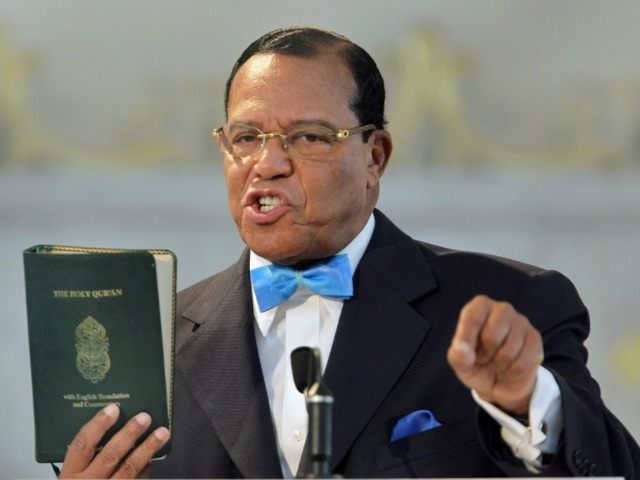The Iranian regime will host a ceremony and official unveiling of its new drone, the “Shahed 129,” this Thursday, which, according to Iranian state-controlled outlet Tasnim News Agency, will be attended by Nation of Islam head Louis Farrakhan. “Shahed” is Persian for “eye-witness.”
Tasnim News Agency indicates that Farrakhan, 82, will be the guest of honor and deliver a speech to mark the occasion. Iranian President Hassan Rouhani, 67, will also be present, as will several other leaders involved in the global Islamic movement.
The ceremony coincides with the 37-year anniversary of Iran’s Islamic revolution, which resulted in the overthrow of Iran’s last Shah Mohammad Reza Pahlavi, who was officially ousted from his homeland on February 11, 1979, and which set the standard for the nation’s planned expansionism and spread of Shia-backed dominance throughout the Middle East.
Ceremony coordinator Asghar Abkhezr told Tasnim News that more than 450 guests from 28 different countries will attend the event.
Iranian reporter Sobhan Hassanvand with the Shargh Daily newspaper announced the news of Farrakhan’s presence at the event as “big.” Farrakhan is no stranger to wild conspiracy theories, antisemitic rhetoric, and attacks on whites and members of the LGBT community.
Iran’s Revolutionary Guard (IRGC) first introduced the Shahed 129 drone in September of 2012. Last week, Iran-state controlled Fars News Agency reported that the now “mass-produced” unmanned combat aerial vehicle (UCAV) has already engaged in combat in Syria. The drone has an endurance of 24 hours, which makes it the first Iranian medium-altitude long-endurance (MALE) UAV.
The United States, Israel, Turkey, China, India, Italy, and South Africa also have MALE UAVs.
IRGC Commander General Aziz Jafari has also reportedly indicated that Iran is currently marketing the Shahed 129 for export to potential international customers.
According to Tasnim, Iran’s “Emad” ballistic missile and “Simorgh” satellite carrier will also be showcased at Thursday’s event, both of which the regime touts as achievements in the areas of the country’s defense, nuclear science, and technology. The Simorgh satellite is designed to put a small payload, which is often listed as being up to 132 lbs (or 60 kg), in a 300 mile orbit.
Simorgh, which literally translates to “30 birds” in Persian, is also a mystical creature in Sufi literature that bears similarity to the phoenix. It is also a story from the Persian Sufi poet Farid ud-Din Attar (Attar of Nishapur) which tells of the leadership and guidance necessary to fulfill the ultimate goal of a journey.
On Wednesday, the United States Armed Services Committee published an unclassified intel report in conjunction with Director of National Intelligence James Clapper. Part of the report reads:
We judge that Tehran would choose ballistic missiles as its preferred method of delivering nuclear weapons, if it builds them. Iran’s ballistic missiles are inherently capable of delivering WMD, and Tehran already has the largest inventory of ballistic missiles in the Middle East. Iran’s progress on space launch vehicles—along with its desire to deter the United States and its allies—provides Tehran with the means and motivation to develop longer-range missiles, including ICBMs.
Thursday’s meeting between Rouhani and Farrakhan will not be the first. The duo have rubbed shoulders in the past, including at the United Nations in 2013 at a party hosted by Iran where Farrakhan called President Barack Obama a murderer over the death of Libyan leader Muammar Gaddafi after he was killed by rebel fighters. “We voted for our brother Barack, a beautiful human being with a sweet heart,” Farrakhan said at the time. “Now he’s an assassin.”
In the past, Farrakhan has said, “The Quran teaches persecution is worse than slaughter,” calling for “10,000 fearless men [to] rise up and kill those who kill us; stalk them and kill them and let them feel the pain of death that we are feeling!” He continued, “Then [the Quran] says retaliation is prescribed in matters of the slain. Retaliation is a prescription from God to calm the breasts of those whose children have been slain.”
Follow Adelle Nazarian on Twitter @AdelleNaz.

COMMENTS
Please let us know if you're having issues with commenting.